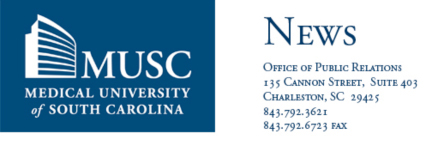
Sept. 23, 2008
Charleston – Friends and family of Charleston resident Kitty Trask Holt have donated more than $1.3 million to help researchers at the Medical University of South Carolina (MUSC) find a cure for scleroderma, the disease that claimed her life on June 15, 2008.
Inspired by her unfailingly positive attitude, Holt’s friends and family began looking for a way to honor her courageous battle with scleroderma while helping put an end to its devastating effects. They decided to establish the Kitty Trask Holt Endowed Chair for Scleroderma Research in her honor at MUSC. In October 2007, Holt, her family, and friends began raising funds for the chair and through their efforts collected over $1.2 million prior to Holt’s passing this spring.
Holt had been living with scleroderma for about 25 years before her death. As the disease progressed, she suffered a gradual loss of independence, giving up her career as a real estate agent, as well as hobbies and normal household chores. Nevertheless, she maintained a positive attitude toward life throughout her illness.
“Throughout all this, the Lord has greatly blessed me with wonderful doctors, terrific friends and the most supportive husband and family that anyone could have,” Holt said, shortly before her passing. Scleroderma, or systemic sclerosis, is an autoimmune connective tissue disease in which the body’s immune system leads to an overproduction of collagen that is then deposited in the skin, blood vessels and internal organs. This often results in hardening of the skin (scleroderma means “hard skin”) and decreased function of organs, such as the lungs and gastrointestinal tract.
MUSC President Raymond S. Greenberg, M.D., Ph.D., stated that the establishment of the endowed chair will accelerate scleroderma research.
“For more than 30 years, MUSC has been regarded as a leader in the field of scleroderma research and patient care,” Greenberg said. “Yet much work remains to be done. The Kitty Trask Holt Endowed Chair for Scleroderma Research will enable us to support a world-renowned authority in scleroderma research, greatly accelerating our efforts to develop new treatments and ultimately a cure for this debilitating disease.”
According to Richard M. Silver, M.D., distinguished university professor and director of the Division of Rheumatology at MUSC, “Scleroderma is an ‘orphan disease’ that does not receive as much attention or funding by the National Institutes of Health or the pharmaceutical industry as other autoimmune diseases. The Kitty Trask Holt Endowed Chair for Scleroderma Research will provide much needed support to assure that the cutting edge scleroderma research being conducted at MUSC will continue as long as the need exists.”
An endowed chair is a fund used to recruit and support a world-renowned researcher, educator or caregiver to an educational institution. The chair is usually established by a philanthropic gift, which is invested in a professionally managed fund. The principal, or “corpus,” remains in this fund, generating interest income that is used to attract and support a leading scientist and/or educator. Because only the investment income may be spent, the corpus portion of the endowed chair exists in perpetuity, creating a permanent means of supporting medical research.
“Kitty touched so many people as she courageously fought her battle with scleroderma,” said James B. Edwards, D.M.D., president emeritus of MUSC and close friend of Ed and Kitty Holt. “Because of Kitty and her determination to help others who suffer from scleroderma, this newly created chair provides so many patients and their families a renewed hope that a cure is on the way.”
About MUSC
Founded in 1824 in Charleston, The Medical University of South Carolina is the oldest medical school in the South. Today, MUSC continues the tradition of excellence in education, research, and patient care. MUSC educates and trains more than 3,000 students and residents, and has nearly 11,000 employees, including 1,500 faculty members. As the largest non-federal employer in Charleston, the university and its affiliates have collective annual budgets in excess of $1.6 billion. MUSC operates a 750-bed medical center, which includes a nationally recognized Children's Hospital and a leading Institute of Psychiatry. For more information on academic information or clinical services, visit www.musc.edu or www.muschealth.com.
#####